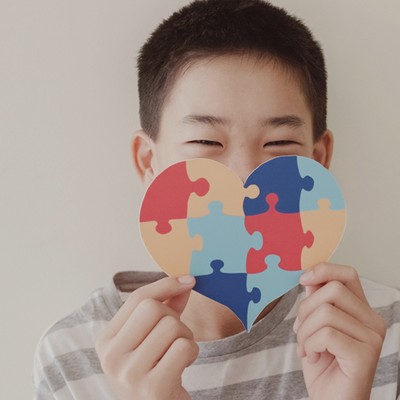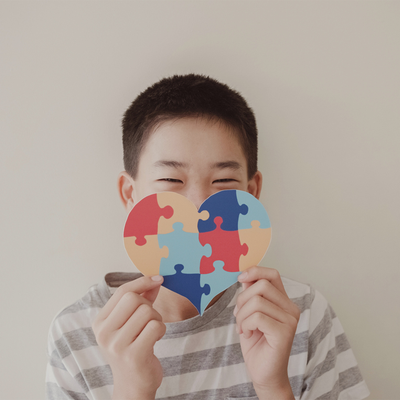

What Every Parent Needs To Know About Autism
All products on this page have been selected by our editorial team, however we may make commission on some products.
Autism Expert & Director Of Education At Cognassist, Dr Louise Karwowski Answers Our Questions…
Is there an agreed definition of autism?
Autism is a developmental disability which affects how people communicate and interact with their surroundings. As autism is a spectrum condition, it affects people in different ways, but common challenges include having difficulties in social communication and interaction, repetitive behavioural tendencies, and heightened levels of anxiety along with periods of feeling overwhelmed and sometimes experiencing a shutdown. Asperger’s Syndrome was retired as a diagnosis in 2013, and now comes under the umbrella of autism.
To be diagnosed on the autistic spectrum, the individual must have difficulties in two areas.
First, they must have persistent problems in social communication and interaction. This includes deficits in empathy, body language, facial expression, and eye contact; and difficulties or lack of interest in social relationships and making friends.
Second, they must exhibit restricted, repetitive patterns of behaviour, interests or activities such as insistence on rigid routines, fixation on certain topics, sensory hypersensitivities such as noise sensitivity and sometimes hypersensitivities – such as a high pain threshold. The problems must be severe enough to cause impairment in everyday life. However, it is important to note many people with autism also often have areas of extraordinary giftedness.
How does the term 'neurodiverse' differ – or does it not?
Neurodiversity is a relatively new term that refers to the cognitive diversity of the human brain among individuals, and the infinite variation in neurocognitive functioning within humans. It acknowledges the fact that we all think and process information differently. It was originally used by the autistic community, who wished to move away from the belief autism was something to be cured rather than being an important part of human diversity. It sees it instead as a neurological difference: one with a unique way of thinking and experiencing the world. Being neurodiverse simply means having a brain that thinks differently. The movement focuses on celebrating neurological diversity and championing the different worldviews and skills that autistic, dyslexic, dyspraxic, and other neurodiverse people have.
You’ve mentioned autism or ASD is often described as a spectrum – can you explain more?
Autism is highly variable – the word ‘spectrum’ refers to how autism is experienced differently by different people; everybody with autism is different. Autism is considered a spectrum because it’s different for every autistic person – some autistic people might need more support than others to live the lives they want to lead. Some autistic people need little or no support, while others may need help from a parent or carer every day.
Is ASD hereditary or genetic in any way?
Autism is thought to be genetic, but it is not necessarily directly inherited. It is possible for autistic parents to have neurotypical children or to have a mix of neurodiverse and neurotypical children.
The genetic link is probably best explained as there being a higher chance of having children on the spectrum if one or both partners are. JAMA (a renowned psychiatric journal) published an article in 2019 that revealed the heritability of ASDs (autistic spectrum disorders) to potentially be as high as 80%.
Is there an agreed set of autism symptoms?
There are some noticeable signs of autism. In young children, some include: not responding to their name, avoiding eye contact, getting very upset if they do not like a certain taste, smell or sound, engaging in repetitive movements, or repeating the same phrases. When they’re slightly older, they might find it hard to say how they feel, prefer a strict daily routine, have a very keen interest in certain topics, or take things very literally during conversation.
It's also important to note that autism can manifest differently in girls and boys. For example, autistic girls may be quieter, may hide their feelings and may appear to cope better with social situations. Often, girls are more likely to ‘mask’ the signs of autism, which means it can be harder to spot.
What development issues should parents look out for?
Some common developmental issues to be aware of include repetitive or rigid language, narrow interests and exceptional abilities, uneven language development, poor nonverbal conversation skills, a lack of/no speech, a lack of eye contact (especially in conversation), and no response to their name.
How should parents go about getting a diagnosis?
If you believe your child may be autistic, there are several people you could speak to in order to get a diagnosis. This can include a GP, a health visitor (for children under five), any other health professional you or your child see, such as another doctor or therapist, or a special educational needs (SENCO) staff at your child's school. Initially, you should ask them whether they think it's a good idea to refer you for an autism assessment. This assessment is done by autism specialists, and it is the only way to find out if you or your child are autistic.
What does having an autistic child mean for parents and the child themselves?
Children with ASD typically continue to learn and compensate for problems throughout life, but most will continue to require some level of support. Planning for your child's future opportunities, such as employment, college, living situation, independence and the services required for support can make this process smoother. Parents can help their children by getting them the right support, working with them, and listening to them, but most importantly loving and treating them like you would any other child.
How might it affect their schoolwork or their social interaction?
School can be incredibly challenging for autistic children. It is typically a noisy environment with lots of sensory stimulation that is often overwhelming. It can therefore be common for them to want to avoid attending school. Autistic children may also feel isolated due to difficulties with social interactions with other pupils, and often even teachers. Furthermore, difficulties with constantly changing rules, routines, or activities can make it difficult to adjust or cope. They’re often at a disadvantage during standardised testing as verbal expression and comprehension are major challenges for them – particularly when it comes to figurative or expressive language. This may therefore be an area where they need a little extra support.
How does autism affect sensory or communicative development?
Many autistic children experience difficulty with interacting, initiating, and responding with others. Some are delayed in their use of language, and even some autistic adults don't necessarily use speech effectively. In those cases, other methods of communication need to be established. An autistic person may appear not to hear what you say to them, not respond to their name, or may appear indifferent to any attempts you make to communicate with them. Instead, they may use physical gestures, pictures or visual cues, or echolalia (the repetition of other people's words) to communicate.
Processing everyday sensory information can be difficult too. Senses can be over or under-sensitive, or both, at different times. A person who finds it difficult to process everyday sensory information can experience sensory overload, or information overload. Too much information can cause stress, anxiety, and possibly physical pain. This can result in withdrawal and distressed behaviour or meltdowns.
So, is it possible for autistic children to still lives full lives?
The concept of normalcy varies widely from person to person because everyone experiences life in a unique way. There is no normal presentation of autism, just as there is no normal family dynamic. Overwhelmingly, adolescents and adults with autism who are asked this question are content, optimistic, and grateful for the life that they have. The definition of normal will vary from person to person depending on the severity of the autism, but an autistic child can and will live a normal life.
Parents can be filled with worry and anxiety over their child’s future, and experience frustration and sadness on days when the child’s behaviour is problematic or they experience difficulty with communication. It is normal to feel this way when you are raising and living with someone on the spectrum.
There are some challenges parents should be aware of if a child has severe autism. While it’s not an actual diagnosis – the official diagnosis is level three autism – severe autism is a way of describing someone's level of functioning and need. They often require 24/7 support and supervision and are more likely to be non-verbal or appear not to notice the people around them.
What therapy or treatment options exist?
The goal of treatment is to maximise your child's ability to function by reducing autism spectrum disorder symptoms and supporting the child’s development and learning. Early intervention during the preschool years can help your child learn critical social, communication, functional and behavioural skills. There are various forms of therapy available that will help in your child’s development and learning:
- Behavioural therapy aims either to increase the ability of communication or to focus on reducing the behavioural problems
- Family therapy involves family members playing an important role in helping the child manage and learn daily routines and language skills
- Speech and language therapy is available to improve communication skills
- Educational therapy
- Occupational therapy aims to teach activities of daily living
- Physical therapy helps to improve movement and balance (perhaps for more severe cases)
No medication can improve the core signs of ASD, but specific medications can help control and manage the symptoms. For example, certain medications may be prescribed if your child is hyperactive; antipsychotic drugs are sometimes used to treat severe behavioural problems; and antidepressants may be prescribed for anxiety.
What advice would you give any parents with autistic children?
Don’t feel disheartened or anxious; autism is simply a form of neurodiversity – it’s a different way of thinking. In actuality, whether we’re neurodiverse or neurotypical, no two brains are the same and the ways in which we learn and work are all unique. Autism also comes with its own set of advantages, such as creativity, strong problem-solving skills, and the ability to spot patterns.
Educate yourself and stay up to date on current research findings, and make sure you are looking at reputable sources of information. If you have a child with autism, it is important to get support. The day-to-day care of children with autism can be incredibly stressful. Making sure your child gets the help they need can also pose a challenge, depending on whether quality support services are available in your area.
Build a support system, too. Seek out local groups and parent network organisations for families of children with autism. Ask your doctor or child developmental specialist for referrals, or join online chat groups for parents of children with autism. Then, make time for yourself and your relationships. Try to schedule regular dates with your partner and outings with friends and keep up with the activities you enjoy.
Finally, seek help if you or your partner is feeling persistently overwhelmed or depressed, or the stress of caring for a disabled child is affecting your relationship. Your health care provider can help you find a qualified individual, couples, or family therapist.
Finally, what’s the one thing everyone should know about autism?
That two people with the same diagnoses have different needs. Not everyone with autism is a genius at maths and not everyone with autism is fanatical about trains. Some people may have sensory needs, others can cope in large rooms with lots of noise and light. The most important thing to do is treat everyone with autism individually, and to find out how best to support them and what works for them.
You can find support with the National Autistic Society, who also run a helpline, and the NHS.
Here, two real-life mothers of autistic children share their experiences…

Former British Vogue staffer Erica Loi found out her son Edoardo was autistic when he was four years old. Now six, he is pre-verbal, while her other son Lupo is neurotypical. Here, she tells us what Edo’s diagnosis has meant for their family…
I never had an inkling that Edo might be autistic or even neurodiverse. He was on the perfect track developmentally, apart from his talking, until he was about 18 months. Looking back, around that age, his diet started to change, and he became increasingly fussy with food, but I didn’t think anything of it. Then, at two, he started a Montessori nursery. It was at this point, a few months in, that the nursery suggested Edo might be deaf. I knew he wasn’t, so I started to panic and did some research online. Autism came up immediately. It was a word I knew incredibly little about…
The official diagnosis happened at age four, but it didn’t feel like a big deal. It felt more life-changing when things started to clarify, and his understanding and communication became somewhat non-existent. For most children with autism, a diagnosis is very much a document that they need. There is no blood test or scan you can give them, so it’s a bit of a waiting game – seeing if things improve, if the child is just a late starter. Every professional tells you not to compare them to their peers, but as a parent you can’t not.
At the start of this journey my world crumbled. My supposedly healthy boy suddenly wasn’t. Controversially, if I could cure him of his autism I would. Even though I’ve understood enough to accept it, he still has a disability. That said, he has shown us that he can achieve anything, and we always persist and bring him to situations which may be challenging at first but eventually become easier. We don’t need to have the same routine with Edo – he handles it, and it means we can travel more. We know he loves the outdoors, which is lovely.
The initial consultations and appointments were terrifying. Words are thrown all over the place with no real meaning and a lot of therapy is recommended. I learnt early intervention is key. The support on the NHS is scarce and for a non-verbal child, speech therapy was offered to us once every fortnight – these are the same professionals telling you early intervention is essential! There are some fantastic charities, which I found a little later on, such as Contact and SOS!SEN, which were amazingm but this is more for knowing your rights. There are, of course, private options but not everyone can access them.
There’s no such history of diagnosed autism in our families. However, knowing the red flags now, I can see how a lot of family members may be on the spectrum. None are as low functioning as my son, however, so we weren’t prepared in the slightest. I’ve found it easier to try to live in the present. And learn to forgive and forget on a really bad day. If it’s been bad for you as a parent, it’s probably been worse for your child. Also, surround yourself with friends who understand, who are patient and loving, and who your kids are comfortable with, too. Our life with Edo is amazing. He is a very happy boy, full of confidence and love. He may not be able to talk yet, but he’s very much understood at school, at home and by anyone who’ll give him that little bit extra time.
I still learn about autism every minute of the day. You also learn there are people right next to you, supporting you and cheering you on. His teachers continue to be amazing – they treat Edo like any other child. His therapists are still very supportive whether we continue to use them presently or not; they’re always checking in on his progress. It’s helped us accept the challenges. It’s hard. It’s hard on your marriage, it’s hard on siblings and it’s hard on yourself, but as long as you understand it will pass, that’s the thing that keeps you going.
My advice to other parents in a similar position would be cry for the first few weeks or even months. Get it out. It’s scary and a huge change. Then you can breathe a huge sigh of relief. Everything will get better and easier, either because of the child’s development or because you get used to it. Also, talk to the nursery and/or school. They will be your wing men. And if they’re not then it’s not the right place for you or your child. Finally, learn to live again. Find a positive in each day. Challenge yourself and your child. Don’t restrict yourselves unless you really must. And listen to your gut – remember, you know best.

Coaching psychologist and author Jessica Chivers is a mum of two, including a son with ASD and ADHD. Here, she tells us more about her experience and what she’s learnt along the way…
Looking back, there were early signs my son might be neurodiverse. That said, he’s been diagnosed with ‘atypical autism’, so it wasn’t staring me in the face. He’s academically bright and had really good language skills. It was his lack of care for other children’s feelings that I first noticed and one incident at a playgroup that still sticks in my mind. Now, as an older child that’s still very much the case, and he’s not interested in understanding other people’s feelings. We’ve had a lot of sibling difficulties.
When he was in year five, I came across something called oppositional defiant disorder. I went to our GP who made a referral into CAMHS (Child and Adolescent Mental Health Service) but they rejected it and the school never suggested they suspected ASD or ADHD. Bizarrely, in the final year of primary school he became a different child, and we thought all the troubles were behind us. But things started to unravel again in his first year at secondary school and we went for a private diagnosis four months in thinking. It was a surprise to have ASD as the primary diagnosis and ADHD inattentive type added six months later.
It was good to have a diagnosis as it gave us an explanation for his behaviour. I wish we’d thought more about the kind of educational setting that would be best for him and made a change back then. Instead, he stayed at the same school until nearly the end of year 11 because he hates change. However, we’re now on the home straight, heading towards GCSEs and we’ve moved him to a smaller setting where he’s getting lots of one-on-one attention. He’s thriving, he’s engaged, and I haven’t had to nudge him to do homework or revision since he’s been there.
Looking back, I wonder whether my mother’s father was on the spectrum. He was a very clever man who got a first in chemistry from Imperial College London and never seemed too interested in people. But our own experience has still been very challenging, with many ups and downs. When we are in a ‘down’ I go into a ‘one day at a time’ mentality and tell myself that there will be an ‘up’ period again soon.
My essential coping mechanisms have been and still are:
- Joining a Facebook group called Add-Vance (from charity of same name) that supports parents and carers of children with ASD and/or ADHD. I’ve been to some of their support groups ad it’s just brilliant to be able to share stories in the group and get advice.
- Working for myself – there is no way I could have held down the kind of work I do working for someone else. I love my work and have the freedom to organise my diary to be able to accommodate things parents of neurotypical children probably don’t. It means I’ve been able to continue to deliver for clients as well as keep the show on the road at home.
- Running, netball and yoga. Solo walks with my dog listening to podcasts. Meditation. Journaling or ‘free writing’ as a I call it – basically pouring my feelings onto the page without editing myself. It’s very cathartic and helps me process the difficulties we’re facing.
The future looks bright for my son. Now that he’s in a smaller educational setting he’s getting so much positive feedback from his teachers. He’s gone from thinking he’ll become a builder to wanting to complete A-levels, go to university and study law. I hate this narrative in our culture about university being the thing every young person should do but as long as he’s happy and feels good about himself, then I’m happy, too.
Some of the main lessons I’ve learnt include: to lower my expectations or try and remove expectations altogether about how something is or isn’t going to pan out. That self-care is vital. Working out what I need to do to keep myself on an even keel and doing it without fail. Finally, that things will be okay and when they’re not, I will get through it.
My main advice would be being open about what is happening in your family – especially with your closest friends and at least one person at work. This is hard stuff you’re going through, and you need to be able to release it and be understood. If you don’t share things it builds up and it’s very draining to ‘cover up’ what you’re going through. Also, seek support from people who are going through what you are; just hearing what they’re going through can make you feel better. Finally, spend time every single day doing something that is just for you where you have no responsibility for the family dynamic/caring for your child etc. For me this is a daily walk with my beloved whippet Rocky.
For more information and advice visit ChildAutism.org.uk and NHS.org.uk. You can also download the Parents’ Guide To Autism from Autism Speaks here and get in touch with Contact.org.uk and SOSSEN.org.uk.
DISCLAIMER: Features published by SheerLuxe are not intended to treat, diagnose, cure or prevent any condition or disease. Always seek the advice of your GP or another qualified healthcare provider for any questions you have regarding a medical condition, and before undertaking any health-related programme.
DISCLAIMER: We endeavour to always credit the correct original source of every image we use. If you think a credit may be incorrect, please contact us at info@sheerluxe.com.


